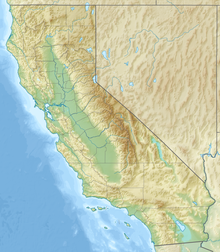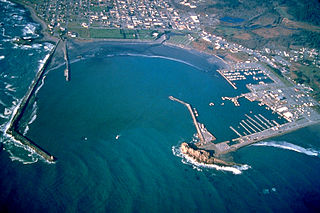
Del Norte County is a county at the far northwest corner of the U.S. state of California, along the Pacific Ocean adjacent to the Oregon border. Its population is 27,743 as of the 2020 census, down from 28,610 from the 2010 census. The county seat and only incorporated city is Crescent City. Del Norte was pioneered and populated by Azorean Portuguese settlers and dairy farmers, which may account for the local pronunciation of the county name. Locals pronounce the county name as Del Nort, not Del Nor-teh as would be expected in Spanish.

Humboldt County is a county in the U.S. state of California. As of the 2020 census, the population was 136,463. The county seat is Eureka.

Mendocino County is a county located on the North Coast of the U.S. state of California. As of the 2020 census, the population was 91,601. The county seat is Ukiah.

The Klamath River flows 257 miles (414 km) through Oregon and northern California in the United States, emptying into the Pacific Ocean. By average discharge, the Klamath is the second largest river in California after the Sacramento River. It drains an extensive watershed of almost 16,000 square miles (41,000 km2) that stretches from the arid country of south-central Oregon to the temperate rainforest of the Pacific coast. Unlike most rivers, the Klamath begins in the high desert and flows toward the mountains – carving its way through the rugged Cascade Range and Klamath Mountains before reaching the sea. The upper basin, today used for farming and ranching, once contained vast freshwater marshes that provided habitat for abundant wildlife, including millions of migratory birds. Most of the lower basin remains wild, with much of it designated wilderness. The watershed is known for this peculiar geography, and the Klamath has been called "a river upside down" by National Geographic magazine.
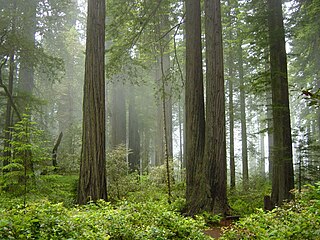
The Redwood National and State Parks (RNSP) are a complex of one national park and three state parks, cooperatively managed, located in the United States along the coast of northern California. Comprising Redwood National Park and California's State Parks: Del Norte Coast, Jedediah Smith, and Prairie Creek, the combined RNSP contain 139,000 acres (560 km2), and feature old-growth temperate rainforests. Located within Del Norte and Humboldt Counties, the four parks, together, protect 45 percent of all remaining coast redwood old-growth forests, totaling at least 38,982 acres (157.75 km2). These trees are the tallest, among the oldest, and one of the most massive tree species on Earth. In addition to the redwood forests, the parks preserve other indigenous flora, fauna, grassland prairie, cultural resources, portions of rivers and other streams, and 37 miles (60 km) of pristine coastline.

Hupa are a Native American people of the Athabaskan-speaking ethnolinguistic group in northwestern California. Their endonym is Natinixwe, also spelled Natinook-wa, meaning "People of the Place Where the Trails Return". The Karuk name was Kishákeevar / Kishakeevra. The majority of the tribe is enrolled in the Federally recognized Hoopa Valley Tribe.
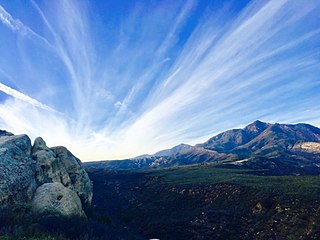
Los Padres National Forest is a United States national forest in southern and central California. Administered by the United States Forest Service, Los Padres includes most of the mountainous land along the California coast from Ventura to Monterey, extending inland. Elevations range from sea level to 8,847 feet (2,697 m).
Chilula were an Pacific Coast Athabaskan tribe speaking a dialect similar to the Hupa to the east and Whilkut to the south, who inhabited the area on or near Lower Redwood Creek, in Northern California, some 500 to 600 years before contact with Europeans.
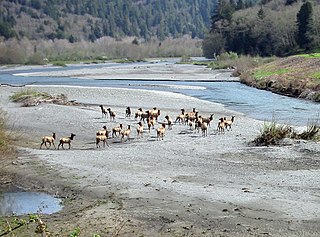
Redwood Creek is a 61.8-mile (99.5 km) river in Humboldt County, California. The river's headwaters are in the Coast Range at about 5,000 feet (1,500 m) and it flows roughly northwest until it empties into the Pacific Ocean near the small town of Orick, the only development in the 280-square-mile (730 km2)-watershed.

The Yurok Indian Reservation is a Native American reservation for the Yurok people located in parts of Del Norte and Humboldt counties, California, on a 44-mile (71 km) stretch of the Klamath River. It is one of a very few tribes who have never been removed from their ancestral lands in California.

The Whilkut also known as "(Upper) Redwood Creek Indians" or "Mad River Indians" were an Pacific Coast Athabaskan tribe speaking a dialect similar to the Hupa to the northeast and Chilula to the north, who inhabited the area on or near the Upper Redwood Creek and along the Mad River except near its mouth, up to Iaqua Butte, and some settlement in Grouse Creek in the Trinity River drainage in Northwestern California, before contact with Europeans.

The Yurok are an Indigenous people from along the Klamath River and Pacific coast, whose homelands are located in present-day California stretching from Trinidad in the south to Crescent City in the north. Like most Indigenous peoples in the United States, the Yurok have been dispossessed of most of their land, the majority of which is now owned by timber corporations or has been taken by the National Parks System.
Klamath and Salmon River War, or Klamath War, or Red Cap War, or Klamath River Massacres, was an American Indian War which occurred in Klamath County California from January to March 1855. The war began from incidents between local settlers and local Indians and a rumor of an Indian uprising against the miners along the Klamath River by the Yurok and Karok Native American tribes. Local miners wanted the Indians armed with guns and ammunition disarmed, anyone trading them to the Indians whipped and expelled from the County and any Indian found with firearms after that time was to be killed. Some of the Indians, mainly a group called the "Red Caps", refused to disarm, and hostilities began between them and the miners. Troops from the California State Militia and U. S. Army were necessary to stop the war.
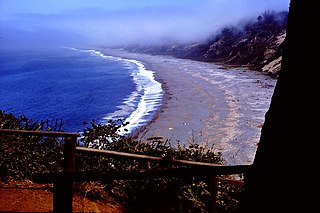
Sue-meg State Park is 25 miles (40 km) north of Eureka, California in the heart of the coast redwood country. Previously named Patrick's Point State Park, Sue-meg is the original place name used by the Yurok people.

Fort Dick is a small unincorporated community in rural Del Norte County, California. Fort Dick is around five miles north of Crescent City, California, and around 15 mi (24 km) south of the California–Oregon state line. Its population is 912 as of the 2020 census, up from 588 from the 2010 census.It is located on the U.S. Route 101 corridor on the Redwood Coast. A post office was set up in 1917.
Requa is an unincorporated community in Del Norte County, California. It is on the north bank of the Klamath River less than a mile (1.6 km) from its mouth, at an elevation of 125 feet.

Orick is a census-designated place situated on the banks of the Redwood Creek in Humboldt County, California. It is located 43 miles (69 km) north of Eureka, at an elevation of 26 feet. The population was 357 at the 2010 census.

Bald Hills War (1858–1864) was a war fought by the forces of the California Militia, California Volunteers and soldiers of the U. S. Army against the Chilula, Lassik, Hupa, Mattole, Nongatl, Sinkyone, Tsnungwe, Wailaki, Whilkut and Wiyot Native American peoples.
Camp at Pardee's Ranch was a military post at Pardee's Ranch from 1858 until the end of the Bald Hills War for U.S. Army troops, California State Militia or California State Volunteers.
The California Indian Wars were a series of massacres, wars, and battles between the United States Army, and the Indigenous peoples of California. The wars lasted from 1850, immediately after Alta California, acquired during the Mexican–American War, became the state of California, to 1880 when the last minor military operation on the Colorado River ended the Calloway Affair of 1880.
